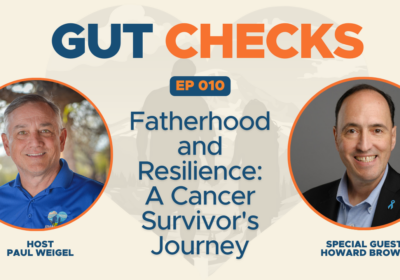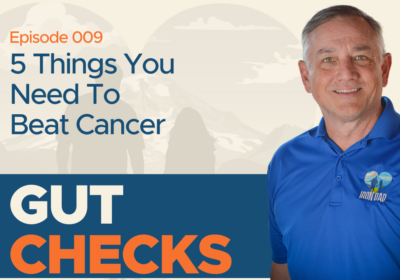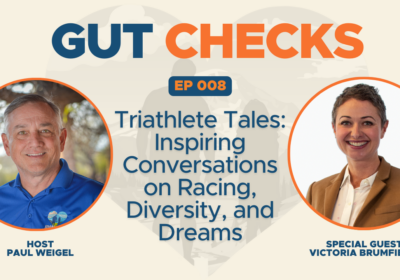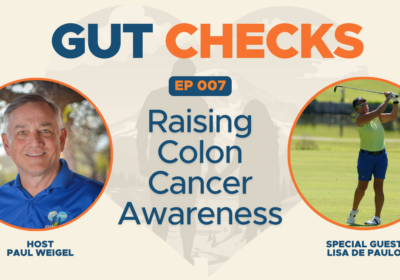From Diagnosis to Ironman Finish Lines: Ryan Switzer’s Story of Hope
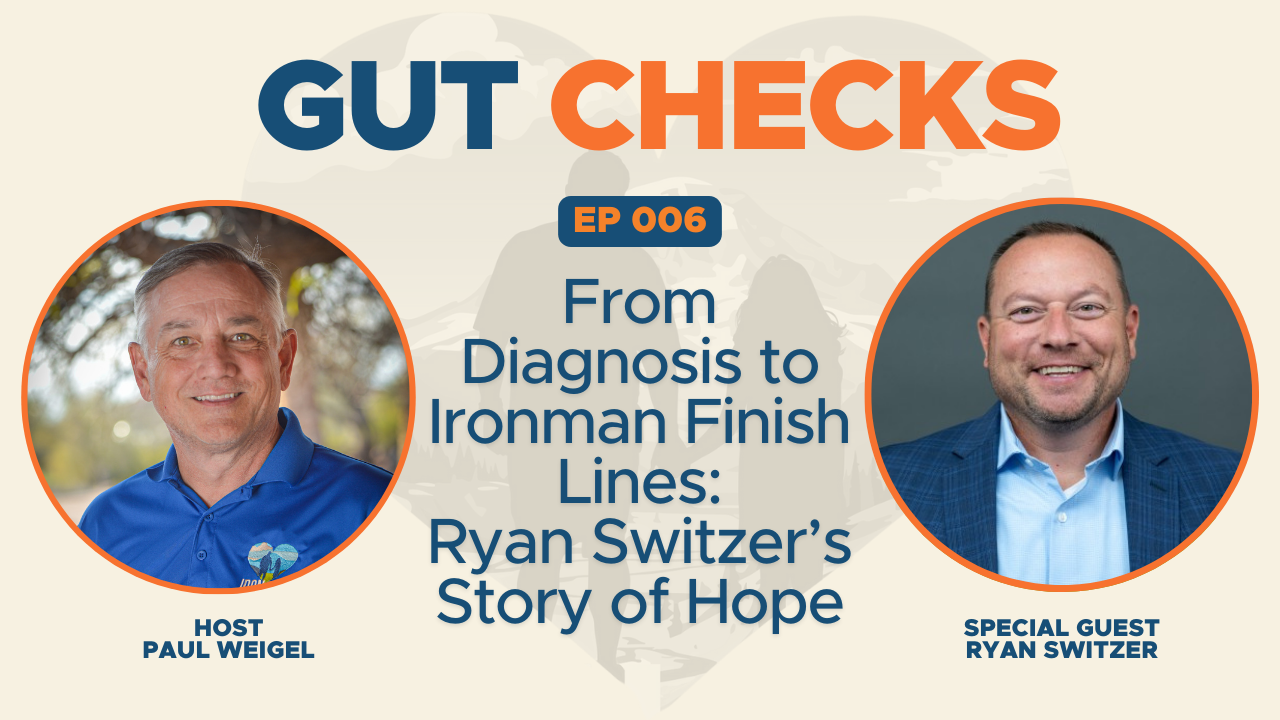
Today, Paul is joined by a very special guest, Ryan Switzer, a friend, fellow cancer survivor, and an avid Ironman triathlete. In this episode, Ryan shares his compelling journey from being diagnosed with colorectal cancer in his thirties to conquering multiple Ironman races. We delve into the impact of his diagnosis on his young family, his rigorous battle through treatments, and how the experience fuelled his passion for endurance sports and charity work. Ryan’s story is not just about facing cancer but transforming this fight into a platform to inspire and support others, including his involvement in fundraising for cancer-related causes. So tune in as we draw inspiration from Ryan’s perseverance and learn how turning personal challenges into opportunities can indeed make a profound difference.
Key Topics
- Overcoming doctor’s reluctance to get colonoscopy and stigma around colonoscopies.
- Support programs educate and provide emotional help.
- Cancer impacts everyone, including family and children.
- Embrace village support during tough times.
About Ryan Switzer:
Ryan Switzer is a kick-ass dad and husband. He is a President of Toll Brothers and is not the former Dallas Cowboy and Oakland Raider. Ryan is a colorectal cancer survivor and an 8-time Ironman triathlete, the former Chairman of the Holt Brothers Foundation, former Chairman of the V Foundation Victory Ride, and former Leukemia Lymphoma Society Student of the Year Board Member. He and his daughter will be taking on Ironman Chattanooga to help make a dent in the fight to cure Parkinson’s disease partnered with the Michael J. Foundation. Ryan and his wife Amy, both graduates of Michigan State University, live in Cary, North Carolina.
About Paul:
To learn more about Paul and the Iron Dad Book, head on over to https://irondadbook.com.
Thanks for listening!
Thanks so much for listening to our podcast! If you enjoyed this episode and think that others could benefit from listening, please share it using the social media buttons on this page.
Do you have some feedback or questions about this episode? Leave a comment in the section below!
Subscribe to the podcast
If you would like to get automatic updates of new podcast episodes, you can subscribe to the podcast on Apple Podcasts or Stitcher. You can also subscribe in your favorite podcast app.
Leave us an Apple Podcasts review
Ratings and reviews from our listeners are extremely valuable to us and greatly appreciated. They help our podcast rank higher on Apple Podcasts, which exposes our show to more awesome listeners like you. If you have a minute, please leave an honest review on Apple Podcasts.
Transcript
Hey everybody. Good afternoon. Welcome to Gut Checks are stories of hope and inspiration and paren. Perseverance. Boy, I am so excited to be here with you today. And you know, as I've been working on my podcast on these podcasts and figuring out the stories I've wanted to tell, you know, the absolute first person that I knew I wanted to include is my buddy Ryan, Ryan Switzer. Welcome, join. Welcome and thank you for joining us today.
Ryan Switzer:Thank you appreciate glad to be here.
Paul Weigel:Absolutely. Well, let me steal for everybody from Why would I choose Ryan? Why would I want to have this guy Brian Switzer on? As we've gotten as I think Brian jokingly said, all these high profile people and then I've got Ryan. Well, Ryan has been a math Ryan, for me has always been one about of hope and inspiration when I got diagnosed 11 years ago. And I had this crazy idea that I'm going to do this Ironman Triathlon. It's like talking with my friends and family about it. A friend of mine said, Well, I already know this guy. He's like, my kid, like the kid, brother of my friend who's doing this race and Carolina. And then we got I got introduced to Ryan and saw the that he in fact, was doing this race and doing the Iron Man ahead of me, which I was like, on one hand, awesome. I've got somebody who I can relate to. And then on the other is like, seriously, he's taken away like, like, my game. So so thanks for that and continuing to do it. And Ryan continues to do this. Not only is he an Ironman triathlete, but I've done six and Ryan, how many full Ironman triathlons have you done since you get diagnosed
Ryan Switzer:than eight now and hope to do a few more? Yeah,
Paul Weigel:if you can continue to push. And I know we'll talk a little bit about that. So Ryan and I, not only when I learned about Ryan and the great things that he was doing ahead of me, I've had a chance to now meet Ryan a few different times and being cancer survivors and triathletes has brought us together. We first met in Louisville, Kentucky, I think we were both less than five years out, having been diagnosed. And then a couple years ago, I unfortunately couldn't race but I got to go travel up to Alaska and watch Ryan compete in Ironman Alaska in Juneau, which was a brutal course. And the water was terrible. And but oh my gosh, it was so neat to see that wonderful accomplishment. So congratulations on that. And all the other races you've done.
Ryan Switzer:Yeah, thank you. And congrats to you. It's fun. You
Paul Weigel:know, at this point, I don't know if it's fun or if it's just the journey that we go through. Right. I mean, that for me, that's kind of where I'm at that during the race. I'm or some of the training. It's like, we're just kind of getting through but to hear you. Why are you are an Iron Man. It doesn't get any better does it
Ryan Switzer:right now. Yeah. That you smile, the whole race, right? It's fun during the train training, like the journey like you said, right? But come the race. It's just big smiles the whole time. Right. It's so much fun.
Paul Weigel:It is a celebration, for sure. We'll as we started and before I let Ryan tell a little bit about his story, cuz he was actually diagnosed with colon cancer when he was in his 30s. Ryan and his wife, Amy. They live in Cary, North Carolina. Right? That's right. And then they have two daughters, Emerson and Peyton. They're both in college at this point, right? Because they got diagnosed.
Ryan Switzer:Oh, no, they were six and 10. Yeah.
Paul Weigel:So similar, similar experience have to hit I can only imagine. But let's talk some about that. Ryan, because you were in your 30s when you learned that you were sick and your kids were six and 10. What were your symptoms? Have you learned that? You had this this thing going on the big slide?
Ryan Switzer:Yeah. So actually, I just signed up for my first Ironman race. And while training with a lot of our neighbors and friends, instead of getting stronger, every day, we go for a bike ride, I will get weaker, and I'd fall further off the back of the pack. And I just like what's going on, I should be getting stronger. You know, things are great, I'm healthy. And I did notice some you know, blood in the stool and things like that, but I just thought Hemorrhoids you know, life you're aging. And luckily, my wife's amazing and said you need to go get checked out. And what for colonoscopy right there no big thing. There'll be scared to have one. So when furcal asked me at age 36 and found a big tumor, right there in the colon in the rectum and you know, had colorectal cancer so that that was the driving force probably if I wasn't training for something, it probably would have gone a little bit further. regret had been even a worse outcome. But you know, the treatment at Duke Cancer Institute was amazing chemo radiation, a number of surgeries, but life is really good. And really, really happy to be here.
Paul Weigel:So your experience is similar to mine, we're both both training for an Iron Man. And our bodies weren't quite working right. But at the same time, we had symptoms going on. Like you said, you had blood in your stool. Did he have anything else going on? I mean, for me, there was certainly I was exhausted. But that was partly I just assumed because I had a three year old kid, I can imagine how would you you may have had some similar things, or were there other issues that you looking back? You knew of that? Were there that had you look back? And you said, oh, yeah, that was this? Yeah,
Ryan Switzer:not really, you know, it was definitely you know, that and a little bit fatigue. So like I said, instead of getting stronger than a long run, or a long bike ride, I was weaker, right? And that was really like, you know, okay, what's going on? What, you know, let's go get checked out.
Paul Weigel:Got Yes. So that must have been a big, it was a big step to get a colonoscopy. Because I mean, so many times is we've been talking with people right now, or, as I've been talking with people that they're hesitant to have a colonoscopy, and many times doctors just ignore it too, right? I mean, it's it's a hemorrhoid or something. How did you talk your doctor into getting a colonoscopy, especially when you're in your 30s?
Ryan Switzer:Yeah. So my first physician, unfortunately, did kind of do that. So that's hemorrhoids. You can deal with those few different ways, right? And then, like I said, you know, I kept kind of getting weaker. And then we went back to where my wife works and saw a physician there. And they're like, No, I think, you know, let's do some labs. Right. And the lab work came back, it was pretty anemic, had some other low scores on some things are like, Yeah, let's see what else is going on? And take a peek. Right. And, you know, it, saw it instantly. Right. It was it was pretty Captain Obvious once once they went into Take, take a take a peek.
Paul Weigel:Sure. So and but it took that next level of discussion, that was the same way for me that I had gotten in a few different times. So thank goodness for me to be saying, Okay, let's look at this a little bit more. Got. That's right. Yeah. Okay. So your your tumor was at a similar place to mine, yours was a little bit lower in your rectum. But what was you what was your treatment? Like? What did you go through in terms of before surgery after surgery? What was kind of your experience? Yeah,
Ryan Switzer:I think mine went pretty well, that was definitely young at the time. Now you see more and more cases in younger people, right, you need to move the age down, right? 50 to 45. Right. So but you know, you go into, and I was fortunate to go do great quality of care. But I would sit there, you know, I was on the Green Machine for radiation. So I had nine weeks of radiation and chemo leading up to, you know, before the surgery, and you got to let your body rest and recover a little bit before your surgery. But I would be sitting there and myself and quite a few older, mostly gentlemen, you know, hanging out in the morning waiting for radiation. And that was, you know, like, wow, like, Why me I'm too young, you know, what's going on? But, you know, as I met more and more people, there's more and more of us out there. Right? And unfortunately, it's increasing. Now, medicine and survivability is also increasing. So there's more survivors and thrivers in the world, which is great as well. But you know, this cancer is very preventable, right. And it's pretty treatable if you get it early enough but but the preventative part is what I could have done better on right and being out in front of it. And so I'm definitely proponent to tell people to go get screened, you know, go get checked for a while. I can't even tell you how many colonoscopies I've had now in my life but for a while I felt like like a dark dog you know, people come up with stuff my butt to say hello to me, right? It's like yeah, we're going to take a look again today. Let's let's see what's going on. But yeah, there's some good medicine some good treatment. And you know, happy to be here today.
Paul Weigel:No, I'm super glad you're here to you talk about between the two of us. I'm sure that I've had many more colonoscopies than I have done Ironman triathlons, and I'm sure you're in the same spot. But there is there still is this really big stigma as I've been talking to people about getting that colonoscopy and it's, oh, I don't want anyone going there. Whether it's sniffing your butter checking it out, or or the prep is too hard. I mean, you want to say something about obviously comparing comparing to finding out you have cancer, you'd rather have a screening, but what's been your experience of getting prepped and being ready for it?
Ryan Switzer:Yeah, it's not bad. And there's a lot of different forms of preps out there. You know, you So you're not gonna go out that night and you're gonna hang out near the restaurant, right? But it's, it's a pretty small price to pay for the benefit. Yeah, I was, during during surgeries, I had an ileostomy bag for about two years. And at first, same thing, I thought, oh my gosh, the stigma of having a poop bag on my belly. You know, I'm like, No, I can't live with life. That'd be horrible. To, you know, just rumors and myths, you know, representations of what you thought it would be once I had it. It was great. Life was good. I still function still did everything. I did an Ironman race within ileostomy. You know, it helped me heal and got me to my next stage, you know, for the next surgery. And, you know, don't be scared of any of those things. They're really not bad at all. And can can change your life for the good. So no big deal.
Paul Weigel:For sure, well, I remember seeing that photo of you training when you're when you're obviously on your trainer, but you're showing off the ileostomy bag. And I think at the same time that you had sent that note that you had talked about being anemic during that time, and I was like, Holy shit, you're a badass to be doing the time we mean. And so what was so sure you were training for an Iron Man beforehand, but why did you decide to keep going? Why did you decide that? Okay, once you're going through treatment, why did you Why do an Iron Man then? Yeah,
Ryan Switzer:I think that fueled me even more than my why became I didn't want to feel defeated, or that you know, big see one, right, like, I want to make sure I could punch him in the throat and keep on going. So I think that helped fuel Matan. And I discovered and doing races, the first one I did was a great way to raise awareness and money for for charity groups. So there was a group called the hope Brothers Foundation that's near and dear to my heart. And they run a it's called Kids can it's at the Cancer Institute, and they help kids deal with life in the family, while one of their parents are battling cancer. So my girls were young, right, six and 10. They didn't know what cancer was, in fact, Emerson, I noticed during treatment, stop hanging out and sit next to me on the couch. And I'm like, you know, whatever, didn't didn't think much of it. At first, I was like, Oh, well, she doesn't understand what's going on and thinks if she touches me, she's going to, you know, catch cancer, right? Like it's a cold as like, wow. Like, I didn't realize their lack of understanding of it. And we're open about hey, Dad's going through stuff, this is what's going on, but they really didn't understand cancer and what it was. So there's some great programs and I'm sure a lot of other university systems have those to provide support for the kids right to educate them give them the emotional support they need and help them deal with life kind of sucks right now right? Like is mom or dad gonna die what's what's life look like? Right? So right kids benefit they went to Camp Kesem which is a national group again, for the same people that either have a parent or guardian battling cancer or maybe they've lost their their loved one to cancer you know, it's paid for it's for you summer camp or you're just for kids just like yourself. And part of its you know, having fun being a kid again, without that going on, but it's also connecting with people that are going through like experience to share you know, emotions and learn from each other. So I use Ironman platform to raise money for them and give back and it helps fuel me right to want to do more is is to give back and raise awareness and money to support other people. And telecare is found for everyone which, you know, while we make great strides, it's still a ways down the road. So there's a lot of help and support between caregiver support, you know, family members support, anything we can do is huge.
Paul Weigel:Well, you you really bring up a great point. And that is yes, we are going as a cancer patient, we are having to fight the disease head on because cancer is in our body or has recently been taken out. Or in many cases it has spread to different parts of the body, but cancer affects everybody cancer affects your friends, your family members, anybody who loves you, and I can. Natalie was three when I got diagnosed. And so the concept of the concept of cancer didn't mean anything to her and she knew dad, Daddy was sick and daddy had a port. But to try and explain anything else was impossible. And you could see that toll that happened on our body. So that's so great that your kids had had those avenues to learn and explore with others so that they're in a better spot. And they've grown up in to be just tremendous young women. It's really neat to watch.
Ryan Switzer:Yeah, yeah. And they helped me and push me so much to do Our other daughter Payton. You know, for those while when I didn't get out of bed for probably a few weeks time around Christmas one year where I just was too fatigued. I think I dropped about 55 pounds that year, you know, was just weak. I looked like, you know, my nine year old self, which I hope I get to 90, right? But she's like, you know, is dad ever gonna get up and play again? You know, that hurt, right? Like, it's like, man, you know, like, I gotta get moving. I gotta get going. Right? But you know, what she did say is, you know, Dad's not going to quit Switzer is don't quit. Right. And you know that yeah, that really, really gets you going right. So that that was part of the fuel to to show up and toe the line and started another race and, and try and do more good for others out there.
Paul Weigel:In and I think I've seen her do some races with you recently or see yourself doing the either or both of them happen. So that must be pretty good to see some of that moving forward.
Ryan Switzer:ah, we just ran the Tar Heel,:Paul Weigel:That is awesome. That I barely can get. I mean, that is not quite true. I can get Natalie up for a 5k sometimes. But the whole thing that I can imagine, I would just be crying the entire race have to if Natalie were to do a half with me, that's congratulations. So yeah. So I know that this year or last year, it's been a year for sure. Oh, that's so cool. And one of the things I mean, along the lines of being so cool, right, and I think you're celebrating a milestone wedding year this year, too. Right? Or you're you're getting close to that. You and Amy Yeah,
Ryan Switzer:yeah, we just celebrated my 10 year cancer anniversary right of being cured. Right. So that's great. And then Amy and I are celebrating our 25th wedding anniversary, which is great. You know, and, and I hope, you know, medicine, yeah, good care around and doing my colonoscopy still. Right? That, you know, we can make it to 50 and 75 and beyond. So
Paul Weigel:it will it is so neat to see how you, you have gone and move forward. And your whole family has been wonderful for that. One of the things you said we have to continue to get screened, nailed that you were at 10 years. I mean, what how often do you have to go in what's kind of your protocol? What kind of type of discussions do you have with your doctor now?
Ryan Switzer:Yeah, so I'm a three right now. And I was you know, six months in the year, three years, and things are great things look really good. I think if I get my next clear one, I believe I go back to every five years, which is awesome. You know, I'm to the point where if I get a cancer, it's no longer reoccurrence, it's a new cancer, you know, is where I'm at in my life. And, and that's it's good, it's a good spot to be. So
Paul Weigel:that is a great specialty. It's, you know, it's ironic I learned this week, I was in for my annual physical. And in spite of all this work I'm doing talking about cancer awareness and prevention and getting screened. I had not put down on my calendar that it was time for my colonoscopy. And so when I went in for my annual physical, he reminded me I was like, How in the world if I'm totally aware of this, could I have forgotten? So we've now got it scheduled, and I'm getting ready for my best nap in my life. So don't zoom. And
Ryan Switzer:you know, when somebody does have cancer, right, kind of the going trend is to go from that age, which I was 35 just turned 36 What happened? Go back 10 years, right for your future generations to have a philosophy. So my wife's Well, I've sat her philosophy twice. Now. Peyton, my oldest has already had hers. So they're going through it, it's no big deal. You know, and they're doing the right thing and being proactive, to you know, get in front of something, if something does come their way. For
Paul Weigel:sure. That's incredible. And to be in their 20s to be thinking that way. That's That's great. So before we wrap up, I guess you you had mentioned you're doing a 70.3 coming up, but I know you've also you're planning for another Iron Man and what else do you have planned? As you're figuring out your next steps in your personal and professional career? Yeah,
Ryan Switzer:I'm excited for any challenge, like challenges, like so like if I can tie it back to a charity and why. So the one we're doing this this summer in Chattanooga, I'm dealing with a bunch of work colleagues that kind of pushed me to toe the line with them and we're doing in support of the Michael J. Fox Foundation. To raise money for Parkinson's. Our co founder co founder Bob toll passed away Parkinson's, a year and a half ago. And one of our great HR legends Jay Lehmann is currently on your 16th of his battle, which is amazing. And he's doing great. But you know, we want to help find a cure for that too, right? And do what we can do to help support the research for that for that as well. Because that's another one, right? That's on the increase. And there's still a lot to be learned, but but a lot of potential to have some big breakthroughs. And we want to do our part to help with that. That's
Paul Weigel:really amazing. Brent. Well, Ryan, you I know I've said it several times. But boy, I am awed and inspired by what you do all the time. And I've gotten better about not crying. It's like, Thank you, thank you. I've gotten better about not crying as we have these discussions. But you've you have meant the world to me. So thank you. I really appreciate that. Jimbo
Ryan Switzer:Valvano says you gotta cry to make it a good day. Right? So I've learned to wear my emotions. I used to think you're weak if you cried, you know, Boy, was I wrong? You know, I also used to think it was weak if you had asked for support and help from others. Again, Brock stupid, right? I was so wrong. Letting your village in around you to help support you with whatever battle you're going through. Is is a game changer, you know, in how that, you know, journey can be for you. So accept whatever people want to offer and support and everybody supports in their own way. Whether it's, you know, bringing over some food or phone call, wanting to mow your yard. Just let them do it. Right. They feel good. And it helps you and you feel good. And things are so much better. I know my wife really appreciated it, you know, she cared the brunt of, you know, what all the bad stuff that goes on during treatment, you know, because it's not all, you know, rainbows and unicorns and Puppy kisses, right? There's some there's some bad dark days. You know, and she anyway
Paul Weigel:ever thought about any of it being bad. Right? He was there? Yes. But but she was there right
Ryan Switzer:to carry the weight and take care of everything, you know. And you know, can't think any of the caregivers enough out there in the world did help others deal with this stuff. You know, your your more meaningful, that support you give than you'll ever know, like how much of a benefit that is?
Paul Weigel:For sure. Well, I learned today or just the other day that Joe Bullock who actually I'm going to be interviewing he, he lives near you, and you guys know each other. And I thought, wow, this is a small world. So and the work he's doing with Man Up To Cancer is really incredible. Yeah,
Ryan Switzer:Joe and Trevor and Manat to cancer is great. Same thing I met through a mutual friend, Trevor a number of years ago, and then found out Joe's like, you know, my neighbor, and we walk on the trail together. And they're doing amazing things to support and have people open up about, you know, issues are going through and talk about it right and not be be scared. Social media is great for that, right? It's bad for a lot of things. But it's great to make connections, you know, I want to met you without I don't want to met Joe and Trevor without it. And you can help so many others that are going through similar experiences, and also love the inspiration and fulfillment you get from learning of other people's stories. And it fuels you to keep on going. There's a lot of a lot more amazing people out there than you and I and it's awesome to get to introduce it and meet those new people every day.
Paul Weigel:That is That is very true. Well, well, I know as we wrap up it. Thank you for being here today. Thank you for everything all of these years. Can't wait to celebrate in 10 more years when you're going when you will be doing your 20 some number 20 Iron Man, and they'll still be stuck at seven or eight but to celebrate with you.
Ryan Switzer:Someday we got to do Conan gather. We got to get there somehow someway, right.
Paul Weigel:Hey, well, you know, we got if Mike, Mike's reading my book. So if Mike is reading my book, you probably just got an avenue in to maybe to get us at the starting line. We'll see it's right now and it will do a fundraiser. One thing I want to say at the end is Ryan Switzer. You are an Iron Man, just in so many so many ways. So thank you. Thanks for your time today.
Ryan Switzer:Appreciate you.
Paul Weigel:Appreciate you





